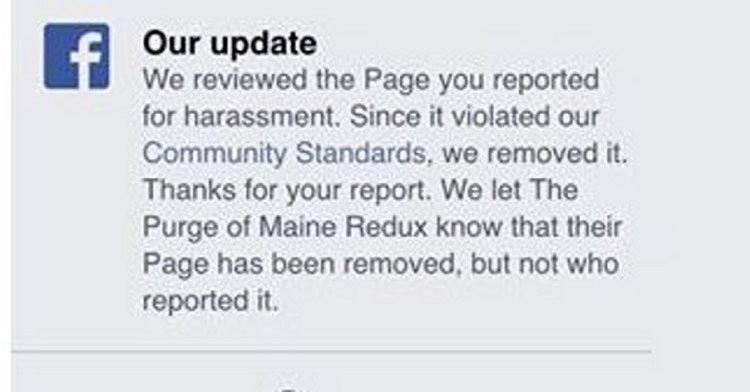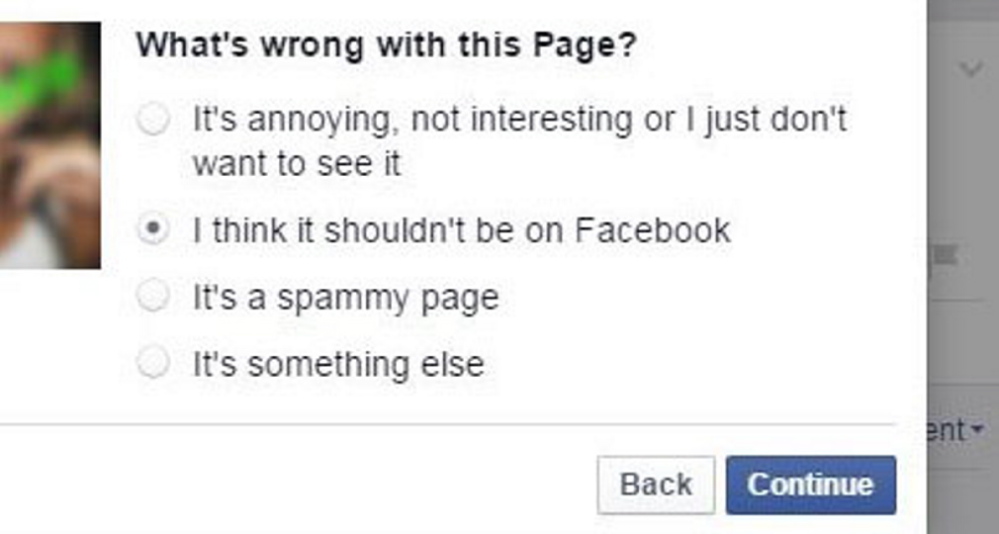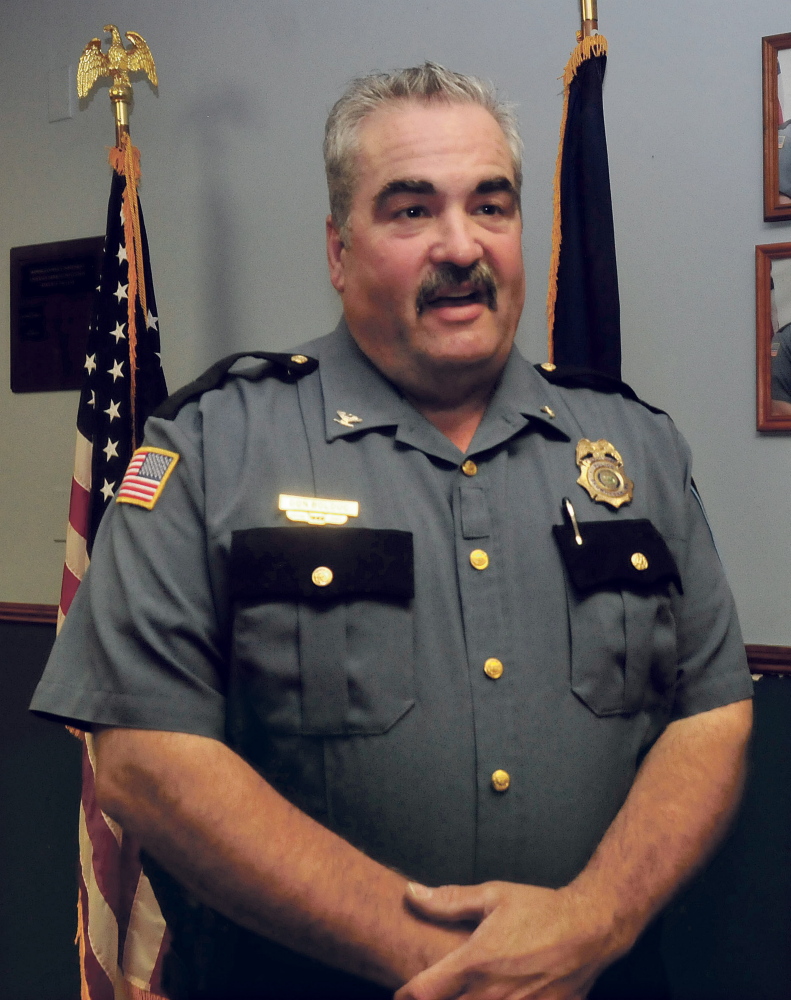A Facebook page that initially featured sexually explicit photos of girls, some from Maine, resurfaced several times during the day Wednesday after it was taken down by Facebook on Tuesday following complaints from law enforcement agencies around the state.
Police Wednesday said that while websites that post sexually explicit pictures of underage people or unknowing ones are common, the magnitude of the case is unusual because it was done on the social networking site, which has an estimated 1.49 billion users.
The original page featured dozens of photos, including several nude and sexually explicit photos of young girls, some from Maine, and a threat that police would not be able to stop the postings.
Most of the photos appear to be selfies — self-portraits — that had been posted on the page, though not necessarily by the person in the photo, said Detective David Armstrong, of the Maine State Police Computer Crimes Unit.
At first Wednesday evening, new iterations of the page didn’t have nude pictures, but did have incendiary remarks from the page’s administrator threatening that things were “about to get extra messy, worse than yesterday by a long shot,” and that the site administrator “is gonna burn this (expletive) state to the ground” and “you wont see me again after today. gotta lay low for a little bit …” Then around 7 p.m., the page’s creators started posting photographs of naked girls — most of whom appear to be under the age of 18. The girls, who are reportedly from across the state, are scantily clad or totally naked and are shown in a variety of poses. Each photograph contains a profanity-laden message from the person who posted the photographs.
The state police task force is leading the investigation and didn’t have answers Wednesday about who was posting the photos or how they were getting them. A handful of the images have been identified as people from Maine, but police are still working to determine where many of them came from.
“The pictures are real,” Armstrong said. “We’re not sure where they’re coming from, but they are real people and it’s a real bad joke.”
He said state police are working with a handful of girls from Maine who have identified themselves in the pictures, but said police haven’t confirmed whether all the pictures on the page are from Maine or of Maine residents.
Facebook took the page down about 8 p.m. The company didn’t respond immediately to requests for comment Wednesday evening.
Police have asked Facebook to preserve all the accounts they believe to be associated with the case so they can’t be deleted. They also are working to put together an affidavit asking for information from all accounts made by the creator of the original page, Armstrong said.
They also are concerned that the content on the site could be put back up online in a different venue.
“We’re still trying to find the source. It could pop up again on another site, not just Facebook,” said Oakland police Capt. Rick Stubbert, one of the law enforcement officers who reported the page. He said that while police have theories about the source of the photos, they don’t have any definite answers.
Central Maine law enforcement officers say the magnitude of the issue has taken them by surprise.
“I’ve been in law enforcement since 1989, and this is the first time I’ve seen anything like it,” said Skowhegan Police Chief Donald Bolduc, who said a community member informed his department about the page Tuesday.
“I’m mortified that somebody would actually do that to another human being,” Bolduc said. “It’s very unfortunate that personal pictures were put on a public forum. It’s very disappointing.”
COMPLAINTS TO POLICE
State police were notified of the page around 5 p.m. Tuesday by the Kennebec County Sheriff’s Office, which learned of the page from a school resource officer in the county, Armstrong said.
He said he thinks the page was up for only a short time, although there were dozens of images on the page, which included about 30 posts and an average five to 10 pictures per post.
The original page was taken down late Tuesday after more than a dozen police agencies from around the state complained about it, but at least three more iterations of it that are believed to be related appeared over the course of the day Wednesday.
Stubbert told a Morning Sentinel reporter Tuesday night that his department had contacted Facebook to ask the company to take the page down.
Armstrong said he knows of at least a dozen police agencies from around the state that contacted Facebook about the page, but doesn’t have a definitive number.
“Everywhere from York County, Somerset County, I think there were some in Bath, the Topsham area out to Rockwood. It was a big area,” he said.
Not all of the pictures on the pages were sexually explicit, and Armstrong said the two pages that remained up Wednesday evening didn’t include sexually explicit photos and hadn’t been taken down by Facebook.
He said police are still concerned about what could surface on the pages, given the content of the original one.
“Check back here or search (the site name) around 4-5ish when everyone is home” was posted on one of the later pages Wednesday afternoon. The page also included an email address and a message to viewers to “Email or inbox me. I’ll take care of your ex.” The email address had a yandex.com address, which is a large Russian search engine that also has a presence in a number of eastern European countries, according to numerous Internet sources.
Facebook messages and an email sent to the page’s creator by a Morning Sentinel reporter were not returned Wednesday.
Alicia Barnes, a Waterville digital media consultant who reported the initial page Tuesday night, also reported the second page Tuesday night and the third page Wednesday morning.
Barnes spends a lot of time on Facebook for her job and reports half a dozen pages to Facebook a day because of content, she said.
She said that on the original page the creator promised the pages always would have two key words in the title so anyone could find the pages easily on Facebook.
Armstrong said that when new pages go up, “each account that comes along has to be evaluated by us and the public and Facebook to see if the information is suitable to take down or if the information violates their protocol.”
The two pages that were still up Wednesday night appeared to not have met Facebook’s criteria for taking a page down, he said. Many of the visitors to the sites were critical of the page.
Armstrong said the cybercrimes unit members “get complaints about this type of thing all the time.”
“It’s not an unusual type of case, but it is unusual in size because of the social media that’s being used,” he said.
When contacted again Wednesday evening, Armstrong said he was unaware of the most recent page.
Armstrong, reviewing the new page, said the photos appeared to show genitals and remarks claiming they belonged to specific individuals, but there was no way to know for sure.
“No faces are shown to say it’s this person,” Armstrong said. He said its possible that the graphic images have been harvested from pornographic sites and then used to represent the identified individuals falsely.
Pressure from multiple law enforcement agencies and the public caused Facebook to take down two previous pages on Wednesday, Armstrong said. The posts Armstrong viewed Wednesday night, however, were marked by users who “liked” the photos and videos. The page creator repeatedly promised to provide additional images when an image or comment receives a certain number of likes.
“Obviously whoever is doing this is feeding off it,” Armstrong said. “He’s asking for likes before he continues and he’s getting them.”
Armstrong said police are working to gather information to submit a request for a search warrant for a judge’s approval.
“Unfortunately it’s not a quick thing,” he said. “Right now we’re kind of stuck.”
Armstrong said Facebook has agreed to preserve all the account information, so those responsible for the pages will be unable to destroy the information while police seek the warrant.
“That preserves all the potential information we may need,” he said. “That’s an ongoing process.”
On Tuesday evening, Cassie Crain, who lives in Harpswell, already had seen enough. The 18-year-old decided to create an anti-nude Facebook page in support of the victims on the other pages. As of Wednesday evening, more than 1,300 people liked the page.
“I started the page to help support these girls,” Crain said. “I’ve heard that two of the girls have tried to kill themselves.”
Crain said she personally knows two of the victims targeted by the perpetrators. She said the girls are both 14 years old and are just entering ninth grade. One of her friends was terrified, while the other friend was trying to stay positive.
“I have no idea who is doing this, but it’s horrible,” Crain said.
Though authorities have not commented on how the nude photographs came into the possession of the Facebook page’s administrator, Crain said she has a theory: The person is hacking into peoples’ phones to gain access to the photos. She said one of the victims reported on her support page that she had been contacted by the rogue Facebook administrator who told her he was hacking into personal phones to collect images.
“I also think there is more than one person involved,” Crain said.
MAKING CHOICES
Law enforcement officials interviewed Wednesday said it’s not uncommon for police to get reports of sexually explicit photos or images being shared online in places such as Anon-IB, an anonymous image board where users can search for pictures by state and even by town.
However, spreading such images on Facebook is not as common.
Messalonskee High School’s resource officer, Tracey Frost, was one law enforcement official who reported the page to Facebook on Tuesday.
Skowhegan’s Bolduc said pornographic images often circulate through sexting, the act of sending sexually explicit photographs or messages via text message.
“I think there’s been a lot of educational opportunities to address that with teenage or high school kids for quite some time,” Bolduc said. “I don’t know if people realize that once a photograph is submitted into the electronic world, via the Internet or social media, it is out there and can never be taken back.”
Detective Ron McGowen, the school resource officer in Winslow, said he meets with students on the first day of school to talk about issues such as sexting and online harassment.
“I think the biggest thing for us is trying to teach them what the outcome could be,” McGowan said. “Our hope is that they make good choices.”
No Winslow students have been reported to have been affected by the current threats, but Facebook harassment is “one of the most common things we deal with,” McGowan said.
Bolduc wouldn’t say whether any of the girls in the pictures are believed to be from the area.
“That’s all under investigation, and everything that we receive, any information, we are passing on to the Maine State Police computer crimes task force,” Bolduc said. “Whether anybody in this area was involved, that’s still under investigation.”
THE LAW
In a news release Wednesday afternoon, Rep. Ken Fredette, R-Newport, said the incident highlights the importance of a law criminalizing posting sexual images without consent that was passed by the Legislature earlier this year.
The law makes “unauthorized dissemination of private images” a class D crime, punishable by a maximum of 364 days in jail and a $2,000 fine. The law goes into effect Oct. 15, according to the Revisor of Statutes office.
“We live in the era of social media, and unfortunately that means we live in a world where this type of behavior is taking place,” Fredette said. “This is exactly the type of act that this law will make criminal in Maine.”
Rep. Diane Russell, D-Portland, the bill’s co-sponsor, said the Facebook page was a “cowardly act.”
“This is precisely why we need legal tools enabling law enforcement to track down and effectively prosecute these dredges of society,” Russell said.
A posting on the original page of photos before it was taken down boasts that police will not be able to stop it.
“This is what happens when the police cannot help you. This is just the beginning. It’s going to get a lot worse,” the post reads. “You may hold on to the belief that the police will save you from me but I promise that they wont (sic). I will expose you.”
Barnes, the Waterville media consultant, said reporting a page on Facebook is easy, but there is no way to specify that it’s child pornography.
There’s a pull-down menu on the Facebook timeline that walks someone reporting a page through a series of questions, and someone can report that a page or photo is sexually explicit. “But it doesn’t have a mechanism for reporting child pornography or a page that features child pornography,” she said.
One of the issues, she said, is that reporting is done through the site. Barnes deals with Facebook all day long — her primary client is Augusta’s Red Barn restaurant, which has more than 40,000 Facebook likes — but she’s never spoken with, or had direct contact with, any Facebook staff members despite her constant engagement with the site.
“I’ve never actually met anybody who works for Facebook,” Barnes said.
She said that Facebook does have a link enabling law enforcement to contact the site.
Armstrong noted that it was only after a public outcry and the involvement of law enforcement that the pages came down.
“Time will tell if the individuals responsible for posting that continue to post inappropriate material that would meet that criteria,” he said. “Can we stop them? I think for now, we can only stop each individual page based on what happens, but they can continue to create new accounts, and that isn’t for us to distinguish. That’s not for us to determine, but for Facebook.”
Staff writer Craig Crosby and Portland Press Herald staff writer Dennis Hoey contributed to this report.
Rachel Ohm — 612-2368
Twitter: @rachel_ohm
Send questions/comments to the editors.




